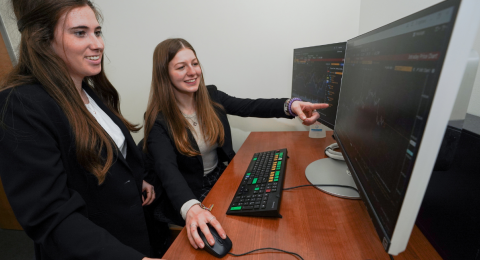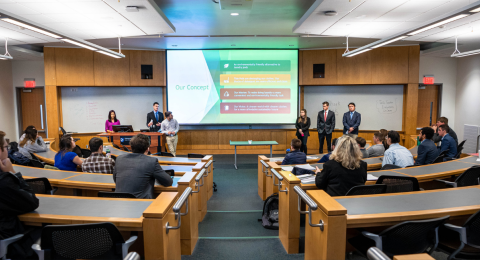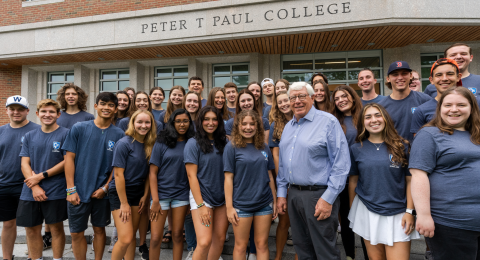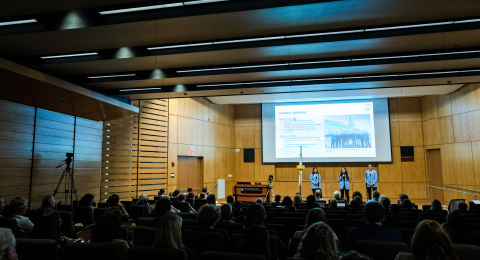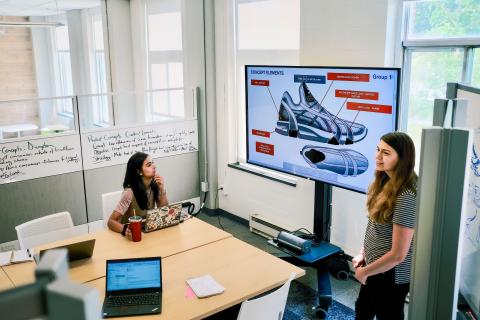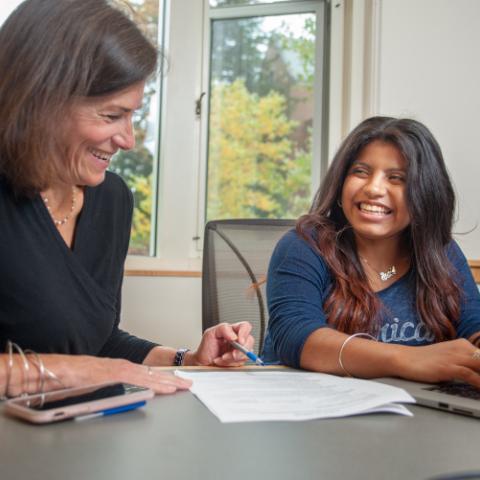Take a look at resources that offer an inside view of academic programs, student life, and career opportunities at UNH’s Peter T. Paul College of Business & Economics (PAUL). Whether you're planning your next steps or just getting to know UNH, these tools will help you picture your future as a Wildcat.
Welcome to Paul
Explore our state-of-the-art facility - a beacon of innovation on campus, boasting 115,000 square feet dedicated to academic excellence, community and growth.

Explore Frequently Asked Questions
Our students will tell you it's the unique experiences they have that help them put what they learn in the classroom into practice on real-world projects with real-world clients. Employers will tell you our students excel because of the competencies and confidence they build as they learn while doing.
PAUL Programs
Looking for additional details about your specific program? Visit our program detail pages to learn more.
PAUL Facilities
Register for an upcoming campus tour to see where you'll live and learn as a Wildcat.
Graduates of UNH's Paul College consistently achieve strong career outcomes. In 2023, 96% of graduates secured employment within 90 days post-graduation, with an average starting salary of $60,000. Notably, 85% of students completed at least one internship before graduation, enhancing their practical experience and employability. Employers commend Paul College alumni for their teamwork, communication skills, technological proficiency, and strong work ethic.
Here are some examples of possible career outcomes by program:
Finance & Accounting
- Financial Analyst at Fidelity Investments
- Tax Associate at PwC
- Investment Banking Analyst at J.P. Morgan
Marketing & Sales
- Digital Marketing Specialist at HubSpot
- Sales Development Representative at Oracle
- Brand Manager at Unilever
Hospitality Management
- Event Coordinator at Marriott International
- Revenue Analyst at Hilton Hotels
- Food & Beverage Manager at Four Seasons
Entrepreneurship & Business Analytics
- Data Analyst at Liberty Mutual
- Business Intelligence Analyst at Deloitte
- Startup Founder in E-commerce or Tech
As a UNH PAUL student, you have access to a variety of clubs and organizations that can enhance your academic experience and professional development. Here are some notable opportunities:
Women in Business Organization
This group empowers and educates members on relevant issues in the business world, providing a platform for networking and professional growth.
UNH Sales Club
A student-run organization that explores career opportunities in sales and marketing. Regular meetings offer insights into the sales profession and networking opportunities with industry professionals.
Honor Societies
Paul College hosts several honor societies recognizing academic excellence:
- Beta Gamma Sigma (ΒΓΣ): The international honor society for business students.
- Eta Sigma Delta (ΗΣΔ): The international hospitality management society.
Additionally, UNH offers over 200 recognized student organizations across various interests. You can explore these opportunities through the UNH Involvement Hub.
Engaging in these organizations can provide valuable experiences, networking opportunities, and enhance your educational journey at Paul College.
As a student in UNH's Paul College, you have access to a diverse array of internship opportunities that can enhance your academic experience and career prospects. Here are some notable examples:
Corporate Internships
-
Accounting and Finance: Students have secured positions at major firms such as KPMG in Boston, leading to full-time job offers.
-
Marketing and Sales: Opportunities are available with companies like Amazon Web Services in Seattle, providing valuable industry experience
Social Innovation Internships
- Non-Profit and Social Enterprises: Through UNH’s Social Innovation Internship program, students gain experience working with organizations dedicated to social missions, allowing them to apply business skills to societal challenges.
Start-Up Internships
- Entrepreneurial Experience: The Paid Student Internship at Start-Ups Program offers hands-on roles in innovative start-ups, working directly with founders. This program is open to freshmen, sophomores, and juniors, providing a unique opportunity to immerse yourself in the start-up environment.
Internship Opportunity Fund (IOF)
- Financial Support: To help students pursue high-quality internships that may be unpaid or located in high-cost areas, Paul College offers the Internship Opportunity Fund, providing stipends of up to $2,500. This support enables students to gain valuable experience without financial constraints.
Additionally, UNH utilizes Handshake, an online platform where employers post internships and entry-level jobs specifically for UNH students. This resource allows you to explore a wide range of opportunities aligned with your career goals.
Engaging in these internships can provide practical experience, enhance your resume, and help you build a professional network, all of which are invaluable as you transition from academic life to your chosen career path.
As a student in UNH's Paul College, you have access to a variety of research opportunities that can enhance your academic experience and professional development. Here are some avenues to consider:
Faculty-Led Research Projects
Engage directly with faculty members on cutting-edge research across various disciplines. Examples include:
-
Diversity, Equity, and Inclusion (DEI) Initiatives: Investigate the impact of corporate DEI programs on stock prices during different U.S. presidencies.
-
Walkable Communities and Public Health: Examine how walkable communities influence health outcomes for expectant mothers and infants.
Undergraduate Research Conference (URC)
Participate in the annual URC, where you can present original research through poster sessions and oral presentations, receiving feedback from university and industry leaders.
First-Year Innovation and Research Experience (FIRE)
For first-year students, the FIRE program offers a year-long, game-like experience that encourages immediate involvement in research and innovation, fostering teamwork and problem-solving skills.
Hamel Center for Undergraduate Research
Access resources and financial support for independent research, scholarly, or creative projects through the Hamel Center, which offers various programs and grants to support undergraduate research endeavors.
Engaging in these research opportunities can provide valuable hands-on experience, enhance your understanding of complex subjects, and prepare you for future academic or professional pursuits.
As a student in UNH's Paul College, you'll benefit from a comprehensive network of academic support services designed to enhance your educational experience:
Dedicated Academic Advising
Upon enrollment, you're assigned a professional academic advisor who will:
- Guide Your Academic Journey: Assist in course selection, major/minor decisions, and ensure you meet graduation requirements.
- Provide Personalized Support: Help set and achieve your academic and career goals, offering expert advice tailored to your interests.
Peer Tutoring and Teaching Assistants
Enhance your understanding of course material through:
- Knack Tutoring: Connect with peer tutors who have excelled in your courses, offering personalized assistance.
- Teaching Assistant Sessions: Participate in sessions led by TAs for subjects like Economics, Accounting, and Business Statistics.
Specialized Academic Resources
Access tailored support for challenging courses:
- Center for Academic Resources (CFAR): Work with educational counselors and peer mentors to improve time management, organization, and study skills.
These services are designed to support your academic success and ensure you make the most of your time at Paul College.


Ready to take the next step?
Let's make it official! Here are some helpful links and resources to get you one step closer to becoming a UNH Wildcat.
Get in touch and we will get back to you as soon as we can.




